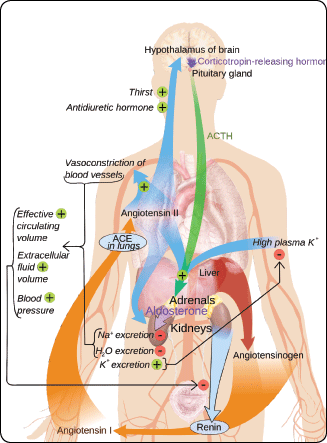What Are Angiotensin Inhibitors And Blockers?
by Dr. Harold Gunatillake – Health writer
Let’s talk about angiotensin before we discuss its actions in the body. Angiotensin is a hormone secreted by the kidneys, and its main function is to constrict arteries in the body. It has no effect on veins as there are no smooth muscles in them to constrict.When arteries constrict by angiotensin participation the blood pressure will increase. Angiotensin also stimulates the release of another hormone called aldosterone secreted in the adrenal glands sitting on top of the kidneys.
To make it a bit more complicated there is another hormone called renin which joins angiotensin and aldosterone to form a system. It is called the renin-angiotensin-aldosterone system (RAAS). This combined system regulates the plasma sodium concentration and the arterial blood pressure.
Angiotensin is further converted into angiotensin 11 by an enzyme called angiotensin-converting enzyme (ACE) found in lung capillaries.Aldosterone helps the reabsorption of sodium from the renal tubules, and also excretes potassium into the fluid which becomes urine.
You will want to know why the body secrets angiotensin to increase the blood pressure and cause harm to the body.
Angiotensin secretion seems to increase or activate in case there is low blood pressure at times of heavy blood loss.
Your doctor would have popularly prescribed an ACE inhibiter to lower your high blood pressure. ACE stands for Angiotensin converting enzymes. So these drugs inhibit the angiotensin 11 that causes increase of blood pressure, by decreasing the production of angiotensin 11. As a result blood vessels relax and enlarge and further make it easier for the heart to pump blood and also improve the function of a failing heart.The common ACE inhibitors prescribed by doctors include perindopril, captopril, enalapril, Lisinopril and Ramipril. Remember if you on a drug ending as’pril’ that would be an ACE inhibitor that benefits to lower your blood pressure, treat heart failure and chronic kidney failure.
These drugs though beneficial to bring down the blood pressure may also produce side affects you should be aware of.
A dry cough seems to be the commonest side effect on ACE inhibitors. If one ACE inhibitor causes this, others also cause a similar chronic dry cough.
You may feel dizzy; suffer headache, drowsiness and general weakness in the body.
Sometimes you may experience a metallic taste in your mouth, chest pain, rash, sun sensitivity and increased blood urea and creatinine.
The more serious side effects are kidney failure when it should help stop further kidney failure, pancreatitis, allergic reactions, decrease in white cells, swelling of legs and liver dysfunction.
When you go for your routine annual blood examination, kidney function tests such as urea, creatinine, electrolytes, eGFR and micro-albumin in urine needs to be checked up.
You must consult your family physicians if you don’t feel well on an ACE inhibitor.Angiotensin 11 receptor blockers (ARBs)
We spoke about the inhibitors that prevent action of angiotensin11. Now there is another set of drugs that blocks the angiotensin receptors. They are referred to as ARBs by your doctor. They too act to bring down the blood pressure, but act differently. These drugs were developed to overcome several deficiencies of ACE inhibitors.These drugs interact at the receptor site and block its action to reduce the blood pressure.Available drugs are- candesartan, Atacand, irbesartan, Avapro, losartan, Micadia Cozaar and vasartan and Diovan.
You will notice that most of these drugs end as ‘tans’ to recognise from inhibitors ending as ‘prils’.
Side effects
Unlike the inhibitors these receptor blockers are well tolerated. The incidence of cough is much less with these blockers. Kidney function is not affected by them. Central nervous system side effects such as headaches, dizziness and fatigue can arise as with the ACE inhibitors. Gastro-intestinal disturbances like dyspepsia and diarrhoea have been reported. Muscle cramping, rash and decreased renal function have also occurred with ARB use.
All drugs have side effects, but one has to balance them with the benefits you gain from such medication.
ACE inhibitors and ARBs are generally prescribed to older people with diabetes, heart problems and kidney disease.
ACE inhibitors have been in existence for over 20 years more than ARBs, and have stood the test of time.
These drugs have saved the lives of many people and you must trust them, if you have been prescribed. They have built up a long list of credentials in terms of cardiovascular and metabolic effects.
Having said that, we now know that ARBs have comparable beneficial effects to ACE inhibitors in patients with heart failure, and identical benefits in patients who have had a heart attack with residual left ventricular (heart) dysfunction.
Hope this article will benefit those who are on these drugs to understand how they work and for better appreciation of the medication.









No Comments